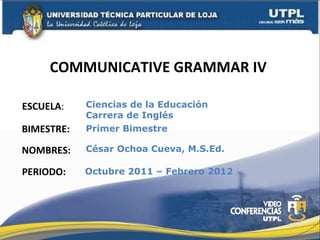
Communicative Grammar IV Escuela: Nombres, Carrera de Inglés
- 1. COMMUNICATIVE GRAMMAR IV ESCUELA : NOMBRES: Ciencias de la Educación Carrera de Inglés César Ochoa Cueva, M.S.Ed. BIMESTRE: Primer Bimestre PERIODO: Octubre 2011 – Febrero 2012
- 3. Simple Past Sofia climbed a mountain two years ago . She traveled to Madrid for two months. traveled climbed To talk about things that happened and were completed in the past. past now future
- 4. Present Perfect & Present Perfect Progressive Use the present perfect and the present perfect progressive with for to show how long something has been true and since to show when something started. They have studied for two weeks to take this test. for two weeks for two weeks have studied She has been working here since 1997. since 1997. since 1997 has been working past now future
- 5. Future Perfect It is used to talk about a future action that will already be completed by a certain time in the future. By the end of the week , I will have bought a new car. By the end of the day , she will have finished her homework. past now future
- 6. Future Perfect Progressive By the end of the next month , She will be living here for ten years. It is used to talk about an action that will be in progress at a certain time in the future. began living next month ten years past now future
- 7. Negative Yes/No Questions Negative yes/no questions begin with a form of be or an auxiliary verb, such as have, do, will, can , or should . Aren’t you students? Haven’t you finished your homework yet? Can’t you use a computer? Didn’t you pass the 3 rd grammar level?
- 8. Tag Questions Form tag questions with statement + tag. The statement expresses an assumption. The tag means Right? OR Isn’t that true? It’s a pretty night, isn’t it? She doesn’t live in a house, does she? statement statement tag tag
- 9. Make Use make + object + base form of the verb to talk about things that someone can require or cause another person (or an animal) to do. The teacher made students rewrite the homework. object base form verb The teacher requires students to do the homework again.
- 10. Have Use have + object + base form of the verb to talk about things that someone can cause another person (or an animal) to do. object base form verb His mother had him study for the test. His mother caused him to study.
- 11. Let Use let + object + base form of the verb to talk about things that someone can permit another person (or an animal) to do. object base form verb His boss permitted him to use the computer. My boss let me use his computer.
- 12. Help His friend helped him to understand traffic rules. infinitive Help can be followed by: object + base form of the verb (more common) OR object + infinitive. The meaning is the same. object His friend helped him understand traffic rules. object base form verb
- 13. Get It has a similar meaning to make and have . It is always followed by object + infinitive, NOT the base form of the verb. object infinitive After some effort, the teacher succeeded in persuading him to stay more time. The teacher finally got him to stay some more time.
- 14. Transitive Phrasal Verbs Most transitive phrasal verbs are separable. This means that noun objects can go after the particle or between the verb and the particle. If the object is a pronoun , it must go between the verb and the particle. noun object She can’t figure the instructions out . noun object She can’t figure out the instructions.
- 15. Transitive Phrasal Verbs Some transitive phrasal verbs are inseparable . This means that both noun and pronoun objects always go after the particle. You cannot separate the verb from its particle. Bob ran his boss into . He ran him into . Bob ran into him. Bob ran into his boss. particle particle
- 16. Transitive Phrasal Verbs A small group of transitive phrasal verbs must be separated. I have to do over the report. I have to do the report over .
- 17. Transitive Phrasal Verbs Some transitive phrasal verbs are used in combination with certain prepositions. A phrasal verb + preposition combination (also called a three-word verb ) is usually inseparable. I think I need to drop out of this class. I can’t keep up with computers.
- 18. Intransitive Phrasal Verbs Some phrasal verbs are intransitive. This means that they do not take an object. The consultant showed up early. Tina is getting ahead in her career. rightbrainaerobics.com
- 19. Adjective Clauses Use adjective clauses to identify or give additional information about nouns (people, places, or things). I know the woman who lives across the street. Loja, which is my hometown , is still my favorite city. This clause identifies the woman. This clause gives additional information about Loja. travelpod.com
- 20. Adjective Clauses Adjective clauses can also identify or describe indefinite pronouns such as one, someone, somebody, something, another, and other(s). I would like to meet someone who speaks Italian. The adjective clause directly follows the noun (or pronoun) it is identifying.
- 21. Two Kinds of Adjective Clauses There are two kinds of adjective clauses, identifying and nonidentifying. The books which are on the table belong to her. The books , which are on the table, belong to her. The adjective clause identifies which books the sentence talks about. The adjective clause is not necessary to identify which books are referred to.
